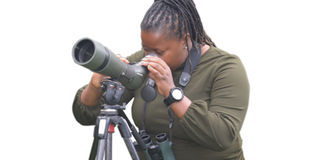Prime
Kemigisha turned birding hobby into an investment

Kemigisha tracks birds using a telescope in Kibale National Park. PHOTO/ ALOSIOUS ATWIINE
What you need to know:
It is in Kibale, where I met Harriet Kemigisha, a seasoned professional birder who has mastered her craft of identifying birds by their sounds and colours in Bigodi village, a burgeoning tourist hub at the edge of the park, south of Fort Portal city
Human connection with wild birds is unique and varied. Watching birds fly or dive across the blue skies is fascinating. Their chirping sounds is the best antidote for stress.
Bird watching is no longer a hobby, but a lifestyle that has gone on to become a recreational activity in Uganda’s national parks.
Birding in national parks is an experience of identifying birds by their colours, voices and behaviour in their natural habitats.
Uganda has a huge birdlife boasting of over 1,050 bird species, making the country one of the top bird destinations in Africa.
My first experience of birding started in Kibale national park, where I took a long hike into the deep rainforest to watch some of Uganda’s rare bird species.
It is in Kibale, where I met Harriet Kemigisha, a seasoned professional birder who has mastered her craft of identifying birds by their sounds and colours in Bigodi village, a burgeoning tourist hub at the edge of the park, south of Fort Portal city.
Kemigisha’s lifelong interest in nature and conservation started at an early age, shaped and influenced by her grandfather who introduced her to the natural world.
It’s her love for nature that shaped her career into becoming a ranger guide with Uganda Wildlife Authority - a job she took in 2004.
“I have been in this career of birding for the last 15 years,” she says.
“It has been a passion from childhood, we could hear birds and then translate their sounds into the local names.”
Birding
She demonstrates this through a whistle akin to the bird’s sound,“…kukukuku..kukuku…kukuku… !”. “That’s the red chested cuckoo bird!” she points out, “Whenever it would make a call, everyone in the village knew that it was going to rain.”
As a ranger guide, Kemigisha realised, birding had become a lucrative venture with more tourists taking keen interest in it.
She took it up as an investment and now, she is a sought after professional birding guide, and one of the finest in Uganda.
It is no wonder that the tree tops and gardens on the sidewalks of Kibale Forest lodge are filled with chirping birds.
The lodge, being one of Kemigisha’s investments, was built with nature’s attraction in mind flourishing with trees, shrubs, climbing plants to give a natural habitat and make it attractive to the birds.
Previously, Kemigisha has worked with the Avian Vocalisation Centre at Michigan State University, USA to record the sounds of rare birds, many of which have never been recorded before for science.
Kemigisha’s birding career was inspired by Herbert Byaruhanga who is currently the President of Uganda Bird Guides club.
“When I got to attend Herbert’s training, I got a bird book and a pair of binoculars, sang the bird’s name and opened the bird guide book to identify the same bird,” she says.
Bird-friendly habitat
Kemigisha says good birding starts with the right habitat.
“One needs to be in an area where there are a variety of birds. You need to get a good natural habitat, many trees, good timing, rain jackets and good gadgets well,” she says.
Speaking of gadgets; a pair of binoculars and a bird guide book is what gives a good start to go birding.
Being sober, and having your mind set ready is what makes you a good birder.
Birding has become lucrative giving a monetary multiplier effect to those living in and on the fringes of national parks.
“Many people benefit from it by monetary value, for example, in Kibale national park, we receive about 2,000 birders every year, and they pay for accommodation and local guides to take them around,” Kemigisha explains.
National parks have varying charges for birding costs. For instance, in Kibale national park, birding charges cost $70 (Shs246,707) for non- resident foreign tourists, and Shs100, 000 for Ugandans.
“When you come out in local communities, there are many birding trails, a tourist is able to pay at least $20 (Shs70,000) for a birding trip that takes at least two to eight hours.
For young people who find a career in professional birding interesting, Kemigisha says, “It is all about passion, and what you want. You need to plant trees to create a habitat in the gardens to attract birds from other places.”
“For the last 15 years, I have achieved a lot, not only financially but also inspiring other women in the industry. I started alone, and I was the only leading female guide in the last 10 years in this country,” she boasts.
Today, Kemigisha runs the Uganda Female Birders club alongside other female birders.
Challenges
The challenge of birding is affording good quality gadgets for the experience.
“For someone to enjoy a good birding experience, you need to have a pair of binoculars to be comfortable with what you are doing,” she says.
Kemigisha also wants government support especially to fund training since birding is not an activity trained from institutions of higher learning.
The pandemic mix turned the tide to more local tourism. Kemigisha says her team was overwhelmed by the number of local tourists interested in birding.
As the economy opens up, Kemigisha has that the colourful world of birding will attract new birders.




